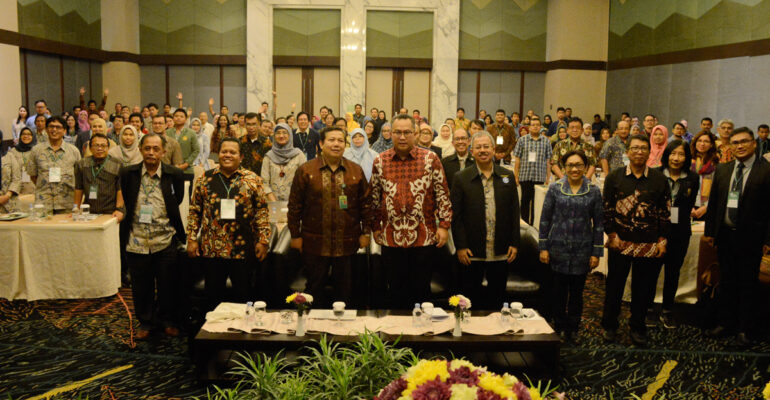Rector of IPB University: Agro-Maritime 4.0 as a Solution to Overcome Natural Damage

This time only 50.7 percent of Indonesia’s territory still has forest cover (primary, secondary and plantation). In addition, 68 percent of rivers in Indonesia are polluted. Most of them are in Java. As many as 25.1 percent of villages experience water pollution and 2.7 percent of villages experience soil pollution.
“Significant damages also occur in coastal ecosystems (mangroves, seagrass, and coral reefs), triggered by beach reclamation, sand dredging, and sand mining activities. Mangrove ecosystems in Indonesia had also declined from 4.2 million to 2.9 million hectares during the 1980-2005 period. The status of seagrass beds in Indonesia is generally categorized as ‘unhealthy’,” said IPB University’s rector, Dr. Arif Satria in his remarks at The 1st International Seminar on Natural Resources and Environmental Management at IPB International Convention Center (IICC), Bogor (15/8). This international seminar, which was held by the Study Program of Natural Resources and Environmental Management (PSL), IPB University’s Graduate School raised the theme of Managing Indonesian Natural Resources and Environment in Disruption Era.
According to him, the environmental crisis and climate change have become a major concern in the global community. There are many innovations of IPB University that can be developed in the Technology Industry 4.0 era.
The Agro-Maritime 4.0 concept initiated by IPB University offers a development platform that integrates terrestrial and marine management in an inclusive manner supported by social and cultural conditions, strong economic capital, and the use of digital technology to drive national productivity.
“Agro-Maritime 4.0 aims to produce products that are healthy, safe, traceable, and certified. This concept also promotes sustainable production, zero-waste consumption, and low ecological footprint while also maintaining biodiversity. We will continue to provide new ideas, innovations, and actions to overcome problems and to improve the quality of our planet,” said Dr. Arif in front of researchers from Japan, Germany, Malaysia, Thailand and Indonesia who attended the event.
The speakers were Secretary-General of Environment and Forestry, Ministry of Environment and Forestry, Bambang Hendroyono; Meteorology, Climatology and Geophysics Agency (BMKG), Nelly Florida Riama who explained about Natural Disaster; and Indonesian Geospatial Information Agency, Dr. Antonius Bambang Wijanarto. (dh/zul/zsp)



